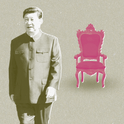Reading Shiv Malik's article, I found it refreshing to see someone actually bother to go and talk to the oft-demonised communities of British Muslims rather than simply talk about them. Malik points out that alienation was an issue; what he does not make clear is that double alienation was at work. The "myth of return" to the homeland, described by Muhammad Anwar in 1979, was prevalent among the first generation of British Muslims, and as such, they did not attempt to help along the integration of their children. The second alienation process came from the class and race-conscious white mainstream, which was not particularly welcoming to this new British population, predominantly poor and brown.
Malik is right to indicate that British Muslims became enamoured by a politicised interpretation of Muslim identity; that is how all minority communities come of age. They find an identity that is "their own." The Muslim community bore witness to a number of events that politicised their maturity: the Rushdie affair in 1989; the Palestinian intifada against Israeli occupation in the 1980s; and perhaps most significantly, the genocide of Bosnian Muslims in the early 1990s.
This politicisation is not necessarily a problem. The idea of belonging to a faith-based community under God (an ummah) has never meant the creation of a fifth column bent on destroying society from within: it means only a recognition of a metaphysical connection between Muslims the world over. But when that recognition is hijacked by heterodox figures at a time when Muslims feel under siege, it allows for all sorts of ideologies to thrive.
Some simplistically condemn that ideology as "Islam," granting religious legitimacy to terrorists that do not deserve it. Others label it as "Wahhabism," ignoring the fact that the Wahhabi establishment condemned terrorism very early on. Commentators on both sides of the Atlantic are now linking their analysis to that of the Muslim world; unsatisfied with crude descriptions of the problem, they are finally getting somewhere. The Amman Message, signed by over 200 religious authorities in July 2005, correctly identified the ideology that has led to sectarian strife in Iraq and terrorism in other parts of the world as "takfirism"—related to the idea of excommunication.
The politicisation of Muslim identity in the 1990s was by and large not religious. When British Muslims became more religious, they became more comfortable with being British; something to which Malik does not pay sufficient attention. Islam provides them with an intellectual heritage thoroughly at ease with British society, without abrogating ethical principles that they share with non-Muslim Britons.
Many will find affirmation of religion in a continent uncomfortable with public expressions of faith a bit disconcerting. But every community comes of age on its own terms. Despite the pressures from within and without, the Muslim community of Britain is evolving, and in a way that looks very promising for Britain. But that future will only materialise if Muslims will find a way to navigate through this natural phase in their history, and if we, the mainstream, focus on solving our problems together, instead of stigmatising a part of our population. Al Qaeda certainly hopes we fail.










